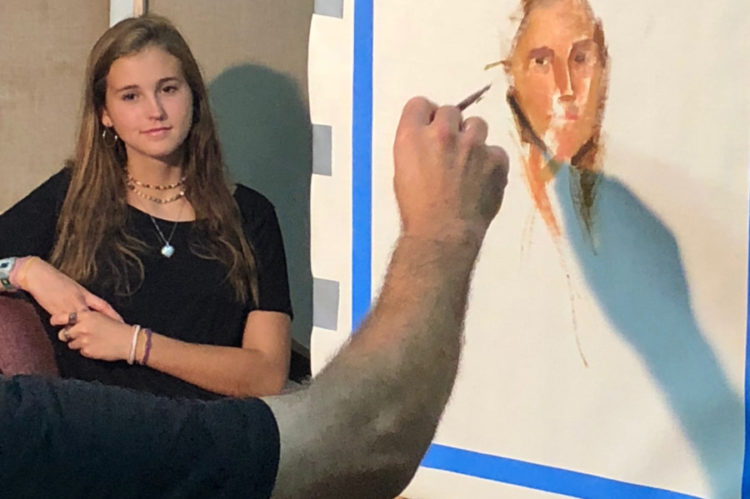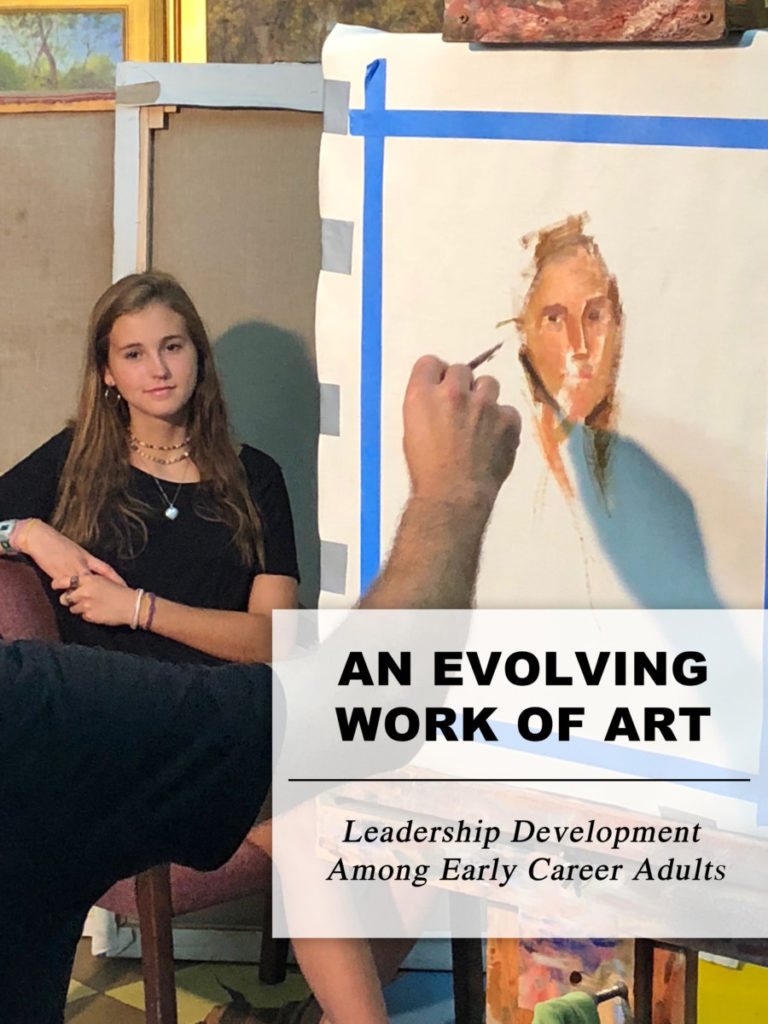A Challenge
Let’s get right down to it: early career adults are less likely to make themselves available as leaders in their communities and congregations. Likewise, as society becomes even more secularized, there are fewer opportunities for early career adults to explore the intersection between work and faith. Even among those who are active in their faith communities, there are few opportunities for young adults to dig deeply into questions of purpose, character, and call, especially as these questions relate to their specific careers. How might that impact the future of our communities, families, congregations, and places of employment?
Key Question
Will an intensive, cohort-based program of small group and one-on-one engagement significantly affect the way early career adults see the intersection between faith and life and effectively equip them for community engagement/leadership?
Project Summary
Eight early career adults (ages 27-37) were invited into an intensive cohort experience rooted in spiritual formation, self-reflection, vocational discernment, and leadership training. The nine-month program used a three-pronged strategy to EQUIP participants with a theological framework (four months of weekly gatherings and two retreats), CONNECT participants with vocational mentors (five months with a vocational mentor), and MOBILIZE participants to be faithful change-agents in their vocation and community.
Some Conclusions
Based on leader observations and extensive group and individual assessment, the pilot program was effective in (1) forming a strong sense of belonging; (2) provoking robust conversation about the intersection of faith and work, (3) providing helpful tools for self-assessment, (4) building desire for vocational mentoring, and (5) and amplifying the need for faithful leadership among early career adults. What is not known is the program’s long-term impact on participants, especially as to whether or not they become more faithfully engaged as community leaders.
The Participants
There were four criteria for participating in the cohort:
- Fall within the target age range (ideally between the ages of 25-35)
- Have at least two years of experience in one’s chosen vocation
- Have a connection with St. John’s, either through membership or family relationship.
- Identify as a Christian
The Plan
The hope is that this time of deep self-reflection, spiritual formation, and leadership training will motivate cohort members to connect faith and work and become more actively engaged in community and church leadership. With that in mind, we incorporate a three-pronged strategy during the cohort:
- Equip participants with a theological foundation for mission while providing tools that help assess one’s personality, giftedness, and leadership, all within the bounds of a strong sense of community.
- Connect participants with a trained vocational mentor who serves as a model and guide in connecting faith and work.
- Mobilize participants who are armed with a specific plan for how they might faithfully and effectively engage their vocation and/or community.
Hoped-for Outcomes
As we journey through this period of training and discovery, we anticipate a number of outcomes for our participants:
- To articulate a greater understanding of one’s identity in relation to God’s identity;
- To more fully trust in God and one another;
- To better understand a language that is rooted in faithful leadership and the work-faith dynamic;
- To identify ways in which participants might bear the light of Christ in places other than the church; and
- To embody key traits of effective leaders.
Our Goal
Our goal was to build a platform of leadership development for early career adults. To build the platform, we challenged two basic assumptions about millennials: their lack of commitment and resistance to deep self-reflection. Indeed, from the very beginning participants understood that this cohort experience would require a high level of commitment and a willingness to engage in honest self-reflection.
Some Observations
Community matters. Younger generations understand that the church is not perfect. They have observed and many have experienced unhealthy Christian community. For most, the jury is still out on what that looks like, but one thing is clear: community matters. That’s particularly true for a generation that is becoming increasingly cynical, isolated, and alone, thanks to technology, information, and consumerism. Our cohort experience provided space for early career adults to form deep relationship and healthy community. They came from very different backgrounds and belief systems, but through this cohort, they helped to craft a new understanding – a new narrative – about what Christian community looks like.
Simple, not shallow. From the planning stage and beyond, we were sensitive to a concern expressed by Sharon Parks and others, “that too many of our young adults are not being encouraged to ask the big questions that awaken critical thought in the first place.”[4] The answer, we posit, is not to create ministry, messages, and programs that are shallow, but ones that are loaded with depth and authenticity, as long as they are rooted in life-giving, joy-filled community.[5] We have attempted to simplify language without dumbing it down.[6] We have avoided providing universal “steps for success” by creating a curriculum/journey that is highly organic.[7] And we have tried to build a solid platform of leadership development that is based upon a simple formula: My Gifts connected to My Community’s Needs leads to My Opportunity for Leadership.[8]
 New funnels are needed. I went to a small, church-affiliated, liberal arts college in North Carolina. Three years ago, the college hired a well-respected, state champion high school band director to build a marching band program. I have enjoyed watching the band grow to over 100 members, adding great energy and entertainment to fall football games. No doubt, it has been a successful venture. Recently I asked the college’s president why they chose such a risky and costly venture. He began by saying that small colleges are facing enormous challenges to recruit good students while sustaining their unique role in liberal arts education. His next statement I wrote down as quickly as I could: “We have to find new funnels through which students become connected to our mission and surrounded in deep, meaningful relationship.”
New funnels are needed. I went to a small, church-affiliated, liberal arts college in North Carolina. Three years ago, the college hired a well-respected, state champion high school band director to build a marching band program. I have enjoyed watching the band grow to over 100 members, adding great energy and entertainment to fall football games. No doubt, it has been a successful venture. Recently I asked the college’s president why they chose such a risky and costly venture. He began by saying that small colleges are facing enormous challenges to recruit good students while sustaining their unique role in liberal arts education. His next statement I wrote down as quickly as I could: “We have to find new funnels through which students become connected to our mission and surrounded in deep, meaningful relationship.”
The same is true for the church. This cohort experience has convinced me that the church must find new funnels of engagement with younger generations – a generation that is not averse to the church’s ancient mission, but seeks meaningful community that is organic, authentic, simple, trustworthy, faithful, loving, inclusive, joyful, and, yes, even Christ-centered
A generation that, like the church, is an evolving work of art.
[1] Ibid., 30.
[2] Niebuhr, Richard. The Meaning of Revelation. (Louisville: Westminster John Knox Press), 2006, pp. 31-41.
[3] Niebuhr, 70.
[4] Parks, xii.
[5] See Marva Dawn, Truly the Community.
[6] See Mike Breen. Building a Discipling Culture: How to release a missional movement by discipling people like Jesus did. (Pawleys Island, SC: 3 Dimensional Ministries, 2011).
[7] See Kester Brewin, Signs of Emergence.
[8] While this formula is not part of Rainer and Geiger’s argument, they have made a compelling case that the church must find ways to simplify our work in making disciples. See Thom Rainer and Eric Geiger, Simple Church: Returning to God’s Process for Making Disciples. (Nashville: B&H Publishing Group, 2006).


